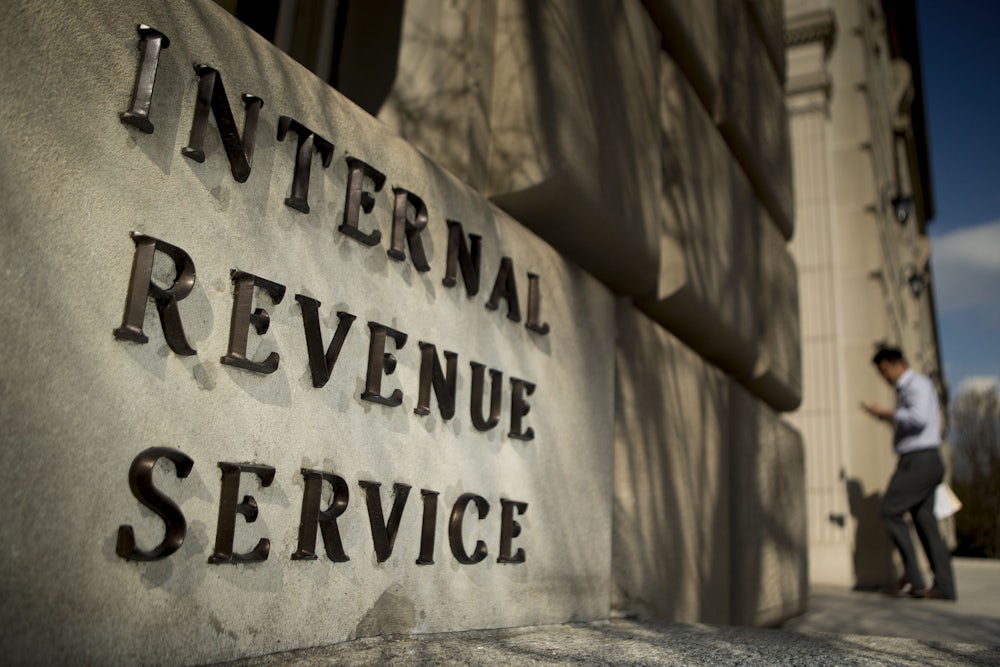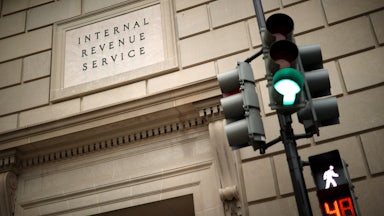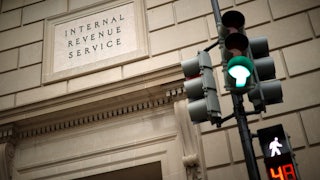It’s always mystified me why Republicans think defunding the Internal Revenue Service is a political winner. Granted, voters are terrified of the IRS, but to presume that means we don’t want the IRS to collect taxes from the rich—the sole cohort that isn’t terrified of the IRS—is just wrong. According to a Navigator Research poll conducted last month, 80 percent of Americans want the rich to pay higher taxes, including a 63 percent majority of Republicans and two-thirds of all Trump voters. Yet when the GOP starves the IRS for cash, the rich don’t even pay the taxes they owe under current law.
For two decades, GOP demagogy kept the IRS budget flat save for cost-of-living adjustments. That ended in 2022 when President Joe Biden signed the Inflation Reduction Act, or IRA, into law, after it was passed by Congress without a single Republican vote. The IRA increased the IRS budget by $80 billion over 10 years, more than half of it allocated to boost enforcement. The IRS said it would use the money to “restore fairness in tax compliance by shifting more attention onto high-income earners, partnerships, large corporations, and promoters abusing the nation’s tax laws.”
The House Republican response was to refuse to raise the debt ceiling unless the $80 billion got knocked down to $60 billion. In effect, the GOP was saying: We won’t let America pay its bills today unless you agree to impede its ability to pay its bills in the future. To forestall a default crisis, the president reluctantly agreed. Then House Republicans pressed to accelerate the $20 billion cut. The Congressional Budget Office last year calculated that the $20 billion cut, which Republicans demanded, would reduce revenues by $44 billion, netting out to a $24 billion increase in the budget deficit—all to help rich people to cheat on their taxes. Now the Treasury says the GOP-imposed cut will cost not $44 billion in revenue but $100 billion. Meanwhile, the House GOP wants to whack another $47 billion out of IRS funding. I refuse to believe this tests well in Republican focus groups.
Trigger warning: If you are rich and dishonest, what follows may distress you. The IRS announced last week that it was using some of its $60 billion funding boost to mail out compliance letters to 125,000 people who haven’t filed tax returns since 2017. Twenty-five thousand of these people earned more than $1 million, and more than 100,000 of these scofflaws earned more than $400,000. At the very least they’re in violation of their legal requirement to file a tax return, for which the penalty is up to 25 percent of the unpaid taxes. We can’t be sure how many of these people owe taxes, but if they don’t, that would merely illustrate former New Republic editor Michael Kinsley’s maxim that scandal resides not in what’s illegal but in what the law cravenly permits. In any event, the IRS says, this single enforcement action will likely reap hundreds of millions in additional revenue.
Is the IRS announcement political? Of course. You’d have to be pretty dense not to notice that 2017 was the year Donald Trump became president and that $400,000 is the threshold above which Biden has promised not to raise taxes. But a pledge to not raise taxes is not the same thing as a promise to not enforce existing tax laws, and I hope the IRS will send out letters to non-filers earning less than $400,000 as well.
Still, it makes economic sense to start with the wealthiest deadbeats because, as the bank robber William Francis Sutton said, that’s where the money is. It’s already the case that people earning more than $1 million pay 39 percent of all federal taxes—and that’s just the Boy Scouts who bother to file their tax returns. Also, there’s a sturdy policy reason to focus on the Trump years because, as David Cay Johnston reported in The Nation last week, tax cheating “became almost risk-free” between 2017 and 2021. Even as the number of people reporting income in excess of $10 million increased by 65 percent, the number of completed IRS audits fell by 90 percent.
The IRS wisely spent the first tranche from its cash infusion on customer service, because things had gotten so bad there that they weren’t even answering the phone. The additional funding allowed the IRS to increase its phone-answering rate from a mind-bogglingly low 10 percent to almost 90 percent and to shorten wait times from an average 28 minutes to an average three minutes. In my experience, Republicans get at least as frustrated as Democrats when they can’t get the IRS on the phone.
In phase two, the IRS used the new Inflation Reduction Act money to reassign 900 of its compliance officers to target millionaires. By mid-January, this effort had brought in $520 million. And that’s before the IRS sent its compliance letters to non-filers. The IRS is also stepping up its oversight of corporations and business partnerships.
Complex partnerships are apparently the principal growth area for tax cheating because they’re so effective at hiding where the money goes. According to the Government Accounting Office, the number of large partnerships increased between 2002 and 2019 by 600 percent. “Partnerships have been killing the IRS for years,” Steven T. Miller, an acting IRS commissioner in the Obama administration, last month told Spencer Woodman of the International Consortium of Investigative Journalists. The IRS is now harnessing artificial intelligence to try to penetrate complex partnership webs. The task will be difficult, but there’s a silver lining, Woodman reported: “Partnership audits have been so remarkably rare that the accountants who create the structures may have lost sight of what exactly is acceptable from a legal standpoint.” In other words, IRS negligence may have left some partnerships so fat and happy that they’ll make easy targets.
This stepped-up enforcement activity will skid to a halt if Trump wins back the presidency. Mostly that will be a product of the GOP’s total commitment to defunding the IRS, but there will also be a second reason: Casting a wider net in tax enforcement will almost certainly entangle Trump. According to Johnston, Trump has a history of creating “fictitious businesses with fabricated deductions,” and Trump’s gotten busted for it twice. New York Attorney General Letitia James, who successfully prosecuted Trump for civil fraud, sent a criminal referral to the IRS two years ago regarding activities that came to light in that investigation. Now the IRS is starting to amass the resources that would be needed to pursue it. Republicans may be wrong to believe voters deplore stepped-up IRS enforcement, but they aren’t wrong to see it as a potential threat to the party’s leader and near-certain standard-bearer.










